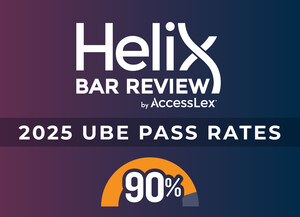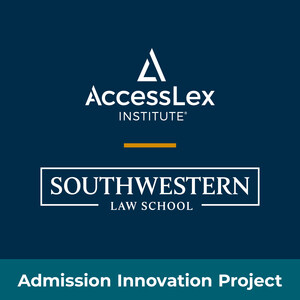
WEST CHESTER, Pa., Aug. 13, 2024 /PRNewswire/ -- AccessLex Institute® released its newest Legal Education Data Deck today, which includes the latest information on law school admission and applicant characteristics, degrees awarded, bar passage, scholarships, and undergraduate debt. The AccessLex Center for Legal Education Excellence® analyzes recent developments to identify trends regarding access, affordability, and value in legal education.
The newest update to the Data Deck reveals that racial and ethnic disparities among law school applicants have remained largely unchanged in recent years. Gaps in admission outcomes persist with 79% of White applicants receiving at least one admission offer compared to 47% of Black applicants.
In the 2022-23 academic year, students of color comprised 35% of first-year enrollment and 46% of withdrawals after the 1L year, the latter representing an increase from 2021-22. Yet, in 2023, the proportion of law degrees (31%) awarded to students of color was the highest recorded.
Disparities are also reflected in bar passage. First-time bar passage for White examinees is higher than for graduates of color, however the gaps in ultimate bar passage are smaller. There is a 24-percentage point disparity in first-time bar passage compared to a 14-point difference in ultimate bar passage two years after graduation for the class of 2021.
Although the share of schools awarding conditional scholarships decreased from 61% to 37%, the proportion of all entering law students who receive conditional scholarships remained consistent. Nearly half of enrolled law school students are carrying undergraduate debt. Of those who still owe balances on their undergraduate loans, the average amount owed is more than $28,000.
"The latest trends in the Data Deck demonstrate that law schools have become more diverse and more generous with financial aid; yet challenges with the accessibility, affordability, and value of J.D. programs remain," stated Tiffane Cochran, Vice President of Research, AccessLex Institute. "Despite these perennial issues, I am encouraged that law schools are equally persistent in advancing inclusivity and equity in legal education and the profession."
Review the updated Data Deck here.
About the Data Deck:
The Legal Education Data Deck utilizes datasets made publicly available by third parties to offer a snapshot of certain trends organized around the three guiding principles of AccessLex Institute's research agenda: access, affordability, and value in legal education. This is a living document that is updated periodically — AccessLex welcomes comments, criticisms, and suggestions in order to make this as useful a tool as possible for all those we serve. Data from the following organizations, institutions, and federal agencies is included: Law School Admission Council, National Conference of Bar Examiners, National Association for Law Placement, American Bar Association Section of Legal Education and Admissions to the Bar, U.S. Department of Education, and U.S. Department of Labor.
About AccessLex Institute®:
AccessLex Institute is a nonprofit organization committed to helping talented, purpose-driven students find their path from aspiring lawyer to fulfilled professional. In partnership with its nearly 200 member law schools, improving access and positively influencing legal education have been at the heart of the Company's mission since 1983. Learn more about how AccessLex is empowering the next generation of lawyers at AccessLex.org.
Media Contact
Julie Solomon
[email protected]
SOURCE AccessLex Institute







Share this article